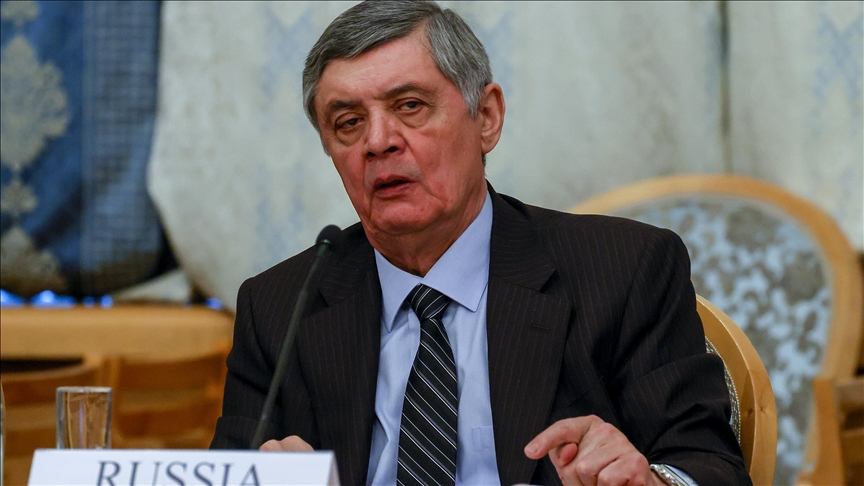US influence in Afghanistan limited by 'manipulation, threats,' says Russia
Following Moscow format meeting on Afghanistan, Russian envoy for Afghanistan Zamir Kabulov says region expects change in country
 Russian Presidential Envoy for Afghanistan Zamir Kabulov
Russian Presidential Envoy for Afghanistan Zamir Kabulov
MOSCOW
Russia's presidential envoy for Afghanistan, Zamir Kabulov, said on Friday that US influence in the country was limited to manipulation with asset freezes and threats.
Speaking at a news conference in Kazan, the capital of Russia's Tatarstan Republic, Kabulov said the US "fled" Afghanistan and "stole, but this is officially called frozen, more than seven billion Afghan assets."
"This is their 'influence'. And also American drones hang over Afghanistan and over Kabul, often threatening representatives of the Afghan authorities for their anti-American position. If this is called influence, then Americans have such influence," he said following a meeting of the Moscow format on Afghanistan.
Kabulov said the attendees of the meeting did not expect any "breakthroughs."
"Inclusive governance in Afghanistan is important for the Afghan people first of all, we proceed from this. Any other non-inclusive structure is short-lived.
"We are not engaged in breakthroughs, we are engaged in solving a problem, it requires patience ... (Our position) implies a patient explanation that will convince our Afghan partners that they need to improve the system of public administration in the country and think more about their people," he said.
The Russian envoy underlined that the Kazan declaration on the results of the meeting had been adopted by all countries, except Tajikistan.
He said the Tajik side disagreed on certain points of this declaration, but declined to elaborate further.
Addressing the participants, Russian Foreign Minister Sergey Lavrov said Western countries have inflicted "irreparable damage" on the Afghan people, and must shoulder the main burden of the post-conflict reconstruction of the war-torn country.
Instead, he added, the US has frozen Afghan assets, which are needed in Afghanistan where people live in difficult conditions.
He voiced concern over attempts by non-regional players to intensify their activities in Afghanistan and reestablish military presence.
"We consider unacceptable the return of the US and NATO military infrastructure to the territory of Afghanistan and its neighboring states, no matter what pretexts they may use," Lavrov stressed.
The Russian presidential envoy for Afghanistan, Zamir Kabulov, told reporters on the sidelines of the meeting that Moscow expects additional constructive steps by Kabul to form an ethnopolitical inclusive government.
"In the future, this may become the basis for the official recognition of the new Afghan leadership," he said.
Separately, the Taliban said on X that acting Foreign Minister Amir Khan Muttaqi told the meeting that over the past two years the administration, after rebuilding political, security and economic systems, accelerated the fight against insurgent groups, which were "trained by the invaders."
Türkiye's position
Addressing the meeting, Turkish Ambassador to Russia Mehmet Samsar said peace and stability in Afghanistan would have a positive impact on the region as a whole.
He warned against complacency amid the "relative calm" in the country, pointing out risks of terrorist activities spilling into neighboring states.
Samsar said the Taliban's "relentless fulfillment of its obligations to combat terrorism on Afghan soil is very important. The threat of the Khorasan wing of ISIS (Daesh) is real. We must support the interim government in the fight against this organization."
On drug production in the country, he said the Taliban government had managed to reduce it by 80%, urging them to intensify their countermeasures.
The Turkish envoy expressed solidarity with Afghans, noting that Ankara provided the country with $3 million under the UN World Food Program, dispatched seven trains with 8,000 tons of humanitarian aid, and contributed $3 million to the Organization of Islamic Cooperation Fund for Afghanistan.
The envoy also called on the global community and international institutions to maintain humanitarian support for Afghanistan.
"We believe that cooperation with the interim government is very necessary in order to reduce the level of suffering of the Afghan people. We repeat these words in all the forums where we speak," emphasized Samsar.
However, the Taliban's failure to form a cabinet of ministers, which would include all of the largest groups in Afghan society, complicate Türkiye's efforts, as do restrictions on education for girls and work for women, he said.
"The steps that the Taliban Movement will take to ensure political inclusivity and education for girls will contribute to improving the situation for Afghanistan. We will continue to interact on a practical level in a constructive way," he said.
Friday's session is the fifth gathering of the Moscow format of consultations on Afghanistan. It was created in 2017 on the basis of a six-party consultation mechanism of special representatives of Russia, Afghanistan, India, Iran, China, and Pakistan.
Its first meeting was held on April 14, 2017 with the participation of deputy ministers and special representatives of 11 countries, including the Afghan side.
The main goal is to promote the process of national reconciliation in Afghanistan and the early establishment of peace. The last, fourth meeting, was held in November 2022 in Moscow, without the participation of the Taliban.
Besides Russia, the Moscow format for Afghanistan includes India, Iran, Kazakhstan, Kyrgyzstan, China, Pakistan, Tajikistan, Turkmenistan, and Uzbekistan.





